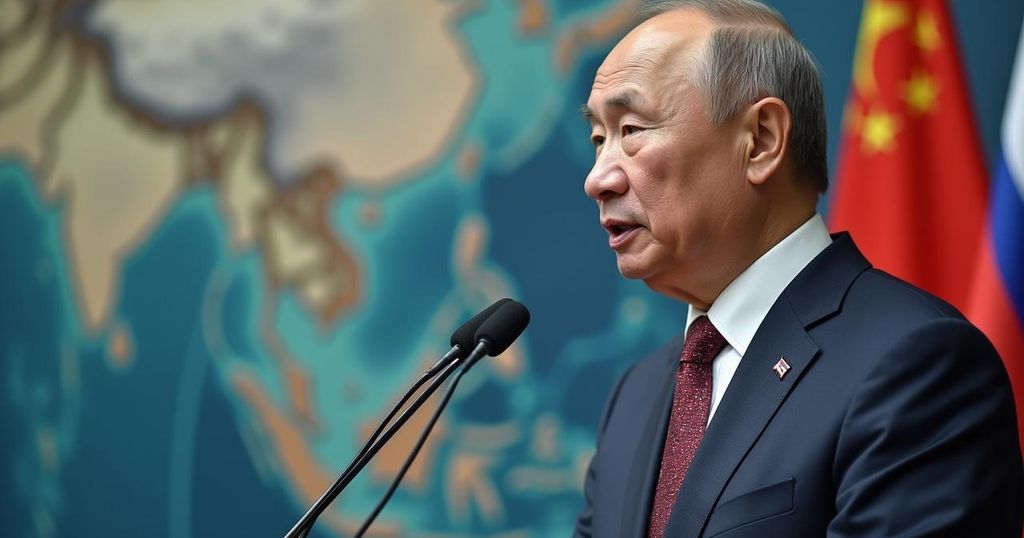Condemnation of Russian Interference in ASEAN’s South China Sea Statement

Cagayan de Oro Rep. Rufus Rodriguez condemned Russia for thwarting an ASEAN statement on the South China Sea, arguing that Russia should not interfere in regional affairs. He claimed that Russia’s actions stem from self-interest tied to China’s support for Russia’s military operations in Ukraine. The South China Sea tensions have prompted the Philippine government to challenge Chinese aggression while emphasizing the inseparability of economic cooperation and political security in the region.
In a recent statement, Cagayan de Oro 2nd District Representative Rufus Rodriguez has publicly criticized Russia for obstructing a draft statement intended for the Association of Southeast Asian Nations (ASEAN). This statement was designed to express a fortified position regarding the code of conduct for the South China Sea, but was blocked by both Russia and China. According to Rodriguez, such interference is unwarranted as Russia should refrain from meddling in regional affairs. He highlighted that the core issue was how ASEAN’s statement would reference the United Nations Convention on the Law of the Sea (UNCLOS). Rodriguez accused Russia of acting out of self-interest, suggesting that Russia’s actions were a gesture of appreciation towards China, which has been supportive of President Vladimir Putin’s military actions in Ukraine. An anonymous U.S. official relayed that both Russia and China had impeded a consensus statement proposed for discussion in the East Asia Summit. While other nations including the United States, Japan, Australia, South Korea, and India were prepared to endorse the ASEAN draft, it was ultimately blocked by Russia and China. The Russian Foreign Minister Sergei Lavrov later justified the lack of adoption of the statement by pointing to persistent efforts by Western nations to frame the declaration in a political context. Escalating tensions surrounding the South China Sea have led Philippine officials, including President Ferdinand “Bongbong” Marcos Jr. and his associates, to openly denounce China’s aggressive actions in the region. The ongoing maritime disputes have recently witnessed confrontations which have prompted the Philippine government to declare certain actions by China as illegal. Marcos, during regional summits, directly challenged China’s Premier Li Qiang, emphasizing that economic cooperation cannot be divorced from political security considerations. He asserted that ASEAN and China cannot ignore underlying tensions while pursuing economic interests.
The South China Sea, a strategically significant maritime area, is claimed in part by several nations, primarily China, which has asserted its claims through extensive territorial assertions and militarization of various features within the sea. ASEAN, a regional intergovernmental organization comprising ten Southeast Asian countries, has continuously sought to navigate the intricate maritime disputes in the South China Sea, particularly in relation to the United Nations Convention on the Law of the Sea (UNCLOS). Recent geopolitical dynamics have heightened tensions, especially with the backdrop of Russia’s military actions in Ukraine and China’s assertive maneuvers within the disputed waters. This context has led to calls for unified regional statements from ASEAN, aimed at counteracting external influences and asserting the rights of Southeast Asian nations within their exclusive economic zones.
In conclusion, the obstruction of ASEAN’s draft statement by Russia and China signifies a complex entanglement of international relations that affects regional autonomy and security. Representative Rufus Rodriguez’s criticisms underscore the principle of non-interference, advocating for ASEAN’s agency in addressing critical maritime issues without external obstruction. The assertion by Philippine officials, alongside ongoing tensions in the South China Sea, highlights the urgent need for coherent diplomatic action and collaboration among Southeast Asian nations in response to the evolving geopolitical landscape.
Original Source: www.inquirer.net








